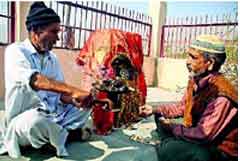Aarti after azaan
 "Puja
and namaz go side by side in our homes,'' says Chand Bhai. "You may say we are
both Hindu and Muslim." The pradhan of Kharkheri, he says that while he and his
wife solemnized their wedding after saat pheras around the holy fire, daughter
Shakina had a nikaah. "The matter of faith is left to individuals,'' quips Nainu
Khan, a retired soldier. "Whether one goes to the mosque or visits the temple is
his or her decision. Most of us can recite the aayats of Koran as fluently as
the Hanuman Chalisa. We celebrate Holi and Diwali as fervently as we observe
Ramzan and Eid.''
"Puja
and namaz go side by side in our homes,'' says Chand Bhai. "You may say we are
both Hindu and Muslim." The pradhan of Kharkheri, he says that while he and his
wife solemnized their wedding after saat pheras around the holy fire, daughter
Shakina had a nikaah. "The matter of faith is left to individuals,'' quips Nainu
Khan, a retired soldier. "Whether one goes to the mosque or visits the temple is
his or her decision. Most of us can recite the aayats of Koran as fluently as
the Hanuman Chalisa. We celebrate Holi and Diwali as fervently as we observe
Ramzan and Eid.''
Interestingly, no one knows how this came to be, or when. These
practices, they say, have been followed by their ancestors down the ages and
they intend to keep them alive. There are just three rituals of Islam that the
Cheeta-Meharats have to compulsorily follow - sunnat (circumcision), dafan
(burial) and eating halal meat. "These practices are a must for all members of
the community, the rest is left to individual discretion," says Rustam Cheeta, a
representative of the Cheeta-Meharat Mahasabha. -- Akhilesh Kumar Singh
Photo: TOGETHER IN PRAYER: Puja or namaaz, the choice is left to the
individual
By Akhilesh Kumar Singh,
Together In Prayer: Puja or
namaaz, the choice is left to the individual clear, urging believers to invoke
Allah with the fazra namaz, the first prayer of the day. At around the same
time, Hindu devotees are awakened by strains of Om Jai Jagdish Hare that wafts
in from the village temple amid the tinkling of bells and clanging of cymbals.
There will be aarti at sunrise.
Chand
Bhai's family in Kharkheri, on the outskirts of Ajmer, responds to both - some
quickly do the wazu (ritual washing of hands and feet for namaz), and the rest
head for a bath before the aarti.
For
Chand Bhai and other members of the Cheeta-Meharat community, who come mostly
from the Marwar region of Rajasthan, this is how it has been since ages. If
Harivansh Rai Bachchan's "Bair badhate mandir, masjid/Mel karaati madhushala' '
(Mosques and temples build differences between people, the tavern unites them),
from Madhushala, holds true for any group, it is this.
"Puja
and namaz go side by side in our homes,'' says Chand Bhai. "You may say we are
both Hindu and Muslim." The pradhan of Kharkheri, he says that while he and his
wife solemnized their wedding after saat pheras around the holy fire, daughter
Shakina had a nikaah. "The matter of faith is left to individuals,'' quips Nainu
Khan, a retired soldier. "Whether one goes to the mosque or visits the temple is
his or her decision. Most of us can recite the aayats of Koran as fluently as
the Hanuman Chalisa. We celebrate Holi and Diwali as fervently as we observe
Ramzan and Eid.''
Interestingly, no one knows how this came to be, or when. These
practices, they say, have been followed by their ancestors down the ages and
they intend to keep them alive. There are just three rituals of Islam that the
Cheeta-Meharats have to compulsorily follow - sunnat (circumcision), dafan
(burial) and eating halal meat. "These practices are a must for all members of
the community, the rest is left to individual discretion," says Rustam Cheeta, a
representative of the Cheeta-Meharat Mahasabha.
But the
Cheeta-Meharats have their set of problems too. Members of the community, which
stands at close to 15 lakh, and are mostly settled in Ajmer, Pali, Raj Samand,
Bhilwara and Udaipur, complain that the government is apathetic towards them.
Moreover, with only about 40 per cent of the community literate and over 70 per
cent living below the poverty line, finding employment is a major
hurdle.
The
Cheeta-Meharats , well-built and of robust constitution, used to earlier line up
in great numbers for jobs in the Army, but with matriculation being made the
minimum qualification even for jawans, this too is not an
option.
"Agriculture is not really viable either,'' says Jalaluddin Cheeta,
one of the only two lecturers the community has thrown up." As most of the
villages are located in the Aravali ranges, where hardly any of the land is
fertile, we can't depend on it for a living."
Of late
they've been beset with another anxiety. In times of religious fundamentalism,
living peacefully with their secular philosophy is not easy. While the Vishwa
Hindu Parishad (VHP) often holds shudhhi (purification ) and ghar-wapasi
(homecoming) camps urging the community to return to the fold, Muslim
organisations have been asking them to discard Hindu ways. "We've even had Hindu
NRIs and West Asian Muslims sending us money to entice us to follow one religion
or the other," says Chand Bhai, who has resisted such initiatives in the past
and vows to uphold the community's peculiar tradition. "I am both Hindu and
Muslim, and I will remain so till my death.''
Source: The Times of India, New Delhi




 Sultan Shahin
Sultan Shahin


0 comments:
Post a Comment